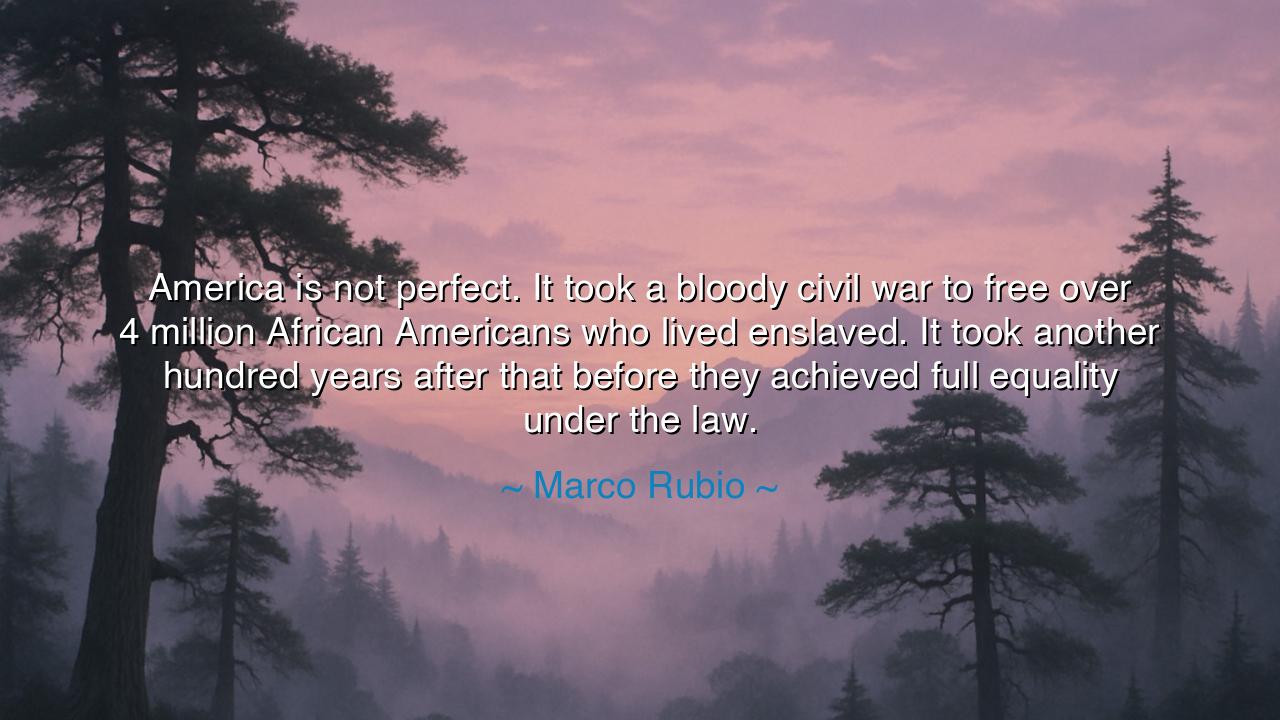
America is not perfect. It took a bloody civil war to free over 4
America is not perfect. It took a bloody civil war to free over 4 million African Americans who lived enslaved. It took another hundred years after that before they achieved full equality under the law.






“America is not perfect. It took a bloody civil war to free over 4 million African Americans who lived enslaved. It took another hundred years after that before they achieved full equality under the law.” These words of Marco Rubio echo like a solemn bell through the corridors of history. They remind us that the story of America — and indeed of all human societies — is not a tale of flawless virtue, but of struggle, sacrifice, and slow awakening. Beneath the rhetoric of greatness lies the truth of imperfection: that freedom and equality are not gifts bestowed once, but victories fought for again and again, through generations of pain and perseverance.
Rubio’s statement carries both humility and reverence. In acknowledging that America is not perfect, he joins a long lineage of voices — prophets, reformers, and leaders — who understood that the greatness of a nation lies not in its purity, but in its capacity to repent, to change, and to strive toward the good. The Civil War, that cataclysm which tore the republic apart, was not a moment of glory but of reckoning. Brother fought against brother, and the land was baptized in blood so that four million souls could finally breathe as free men and women. The Emancipation Proclamation may have been written in ink, but it was sealed in suffering.
And yet, Rubio reminds us, the work did not end there. “It took another hundred years.” A century passed between the thunder of cannons at Gettysburg and the marchers crossing the bridge at Selma. The promise of liberty, proclaimed with grandeur in 1863, was still being denied in practice in 1963. The shadow of Jim Crow, the chains of segregation, and the quiet cruelty of prejudice endured long after slavery’s end. Only through the courage of those who refused to be silent — Rosa Parks, Martin Luther King Jr., Medgar Evers, and countless unnamed heroes — did the United States inch closer to the ideals inscribed in its founding documents.
The ancient philosophers would have understood this struggle well. Aristotle wrote that virtue is not a static state but a continual practice — a discipline of the soul. So it is with nations. No republic is born perfect; it must grow toward justice through trial and correction. The American experiment, like all human endeavors, has been both noble and flawed. Its Constitution declared all men equal, yet tolerated bondage. Its flag symbolized freedom, yet flew over fields of servitude. And yet, the greatness of America lies in its restless conscience — its refusal to let hypocrisy stand unchallenged forever.
Rubio’s reflection is not a condemnation but a call to gratitude and vigilance. Gratitude — for those who died that others might live free; for those who marched so that others might vote, learn, and speak without fear. Vigilance — because the work of equality is never complete. For even now, the echoes of division and injustice remain. To believe that history’s victories have settled the matter is to forget how fragile freedom is. Equality under the law is not a monument built once; it is a garden that must be tended daily, or it will wither.
Consider the lesson of Abraham Lincoln, who understood that the Union’s true redemption would not come from victory alone, but from “a new birth of freedom.” When he spoke at Gettysburg, he looked beyond battlefields to generations yet unborn — to the duty of the living to continue the unfinished work of justice. Rubio’s words belong to that same spirit: a recognition that patriotism is not blind adoration, but honest love — the kind that sees flaws and works to heal them.
So let this be the wisdom passed down: to love one’s nation is to labor for its betterment. Do not be ashamed of imperfection, but be ashamed of complacency. Learn from the sacrifices of the past — from the slaves who dreamed of liberty, from the soldiers who fought for it, from the marchers who demanded its fulfillment. Let every citizen understand that freedom, once gained, must be guarded; that equality, once written in law, must be lived in truth. And remember always that progress, though slow and costly, is sacred. For in every act of courage and compassion, we help build that more perfect union which generations have bled and prayed for — the union of justice, equality, and enduring hope.






AAdministratorAdministrator
Welcome, honored guests. Please leave a comment, we will respond soon